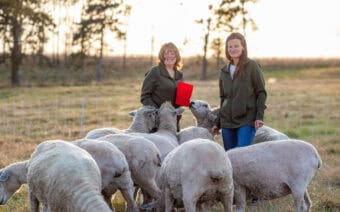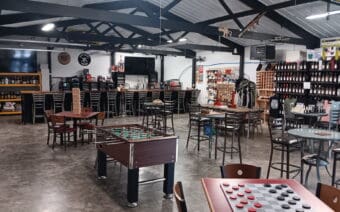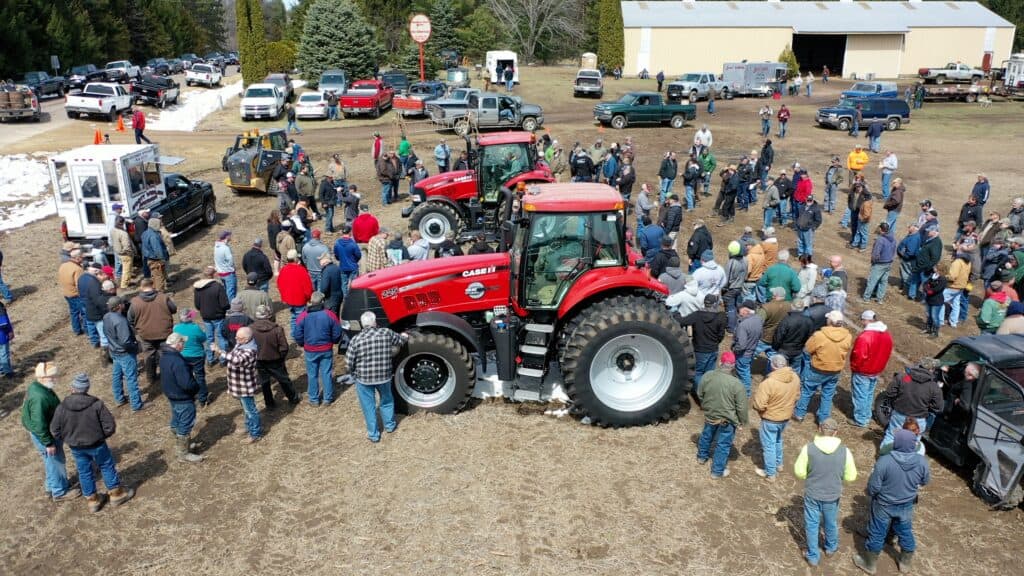
October 28, 2024
MONDOVI – As a second-generation auctioneer, Scott Werlein said he has sold everything from squad cars, fishing boats, popup campers and farm equipment, to barn doors, Harley-Davidson motorcycles, rotisserie ovens, bakery bun makers and lawnmowers.
Add that to businesses, beef cattle, and farmland to firearms and even hay – it would probably take less time to list things he hasn’t sold.
Werlein – the owner of ProCountry Auction Service (838 N. State Road 37 in Mondovi) and incoming president of the Wisconsin Auctioneers Association – said he grew up hearing the signature incantation of the auctioneer.
Werlein said his father, Francis, did that auctioneer’s chant, or bid call – as it’s known in the industry – for more than half a century and was one of the charter members of the Wisconsin Auctioneers Association.
Though he was around it his whole life, Werlein said he didn’t immediately follow in his father’s footsteps.
He said he returned to the area and launched ProCountry in 2006 after his dad’s death, having spent a decade as a commodities broker in the southern part of the state.
Werlein said as the name suggests, ProCountry does most of its business in rural communities – focusing mainly on agriculture-related items, farm equipment and livestock, as well as estates and small businesses that are being liquidated.
Casting a wide net
Werlein said ProCountry’s monthly online consignment auction event features items pooled from multiple sellers.
September’s event, he said, listed everything from a food-grade commercial mixer and collectible cookie jars to snow blowers and a Harley-Davidson Road King.
One in October, Werlein said, featured a selection of campers.
In most cases, he said seven or so photos accompany each online auction item, so an auction with hundreds of items requires hundreds of photos to be taken and uploaded.
With that in mind, Werlein said ProCountry’s 8,000-square-foot warehouse has its own photo studio, where items that fit are staged for their own portfolio.
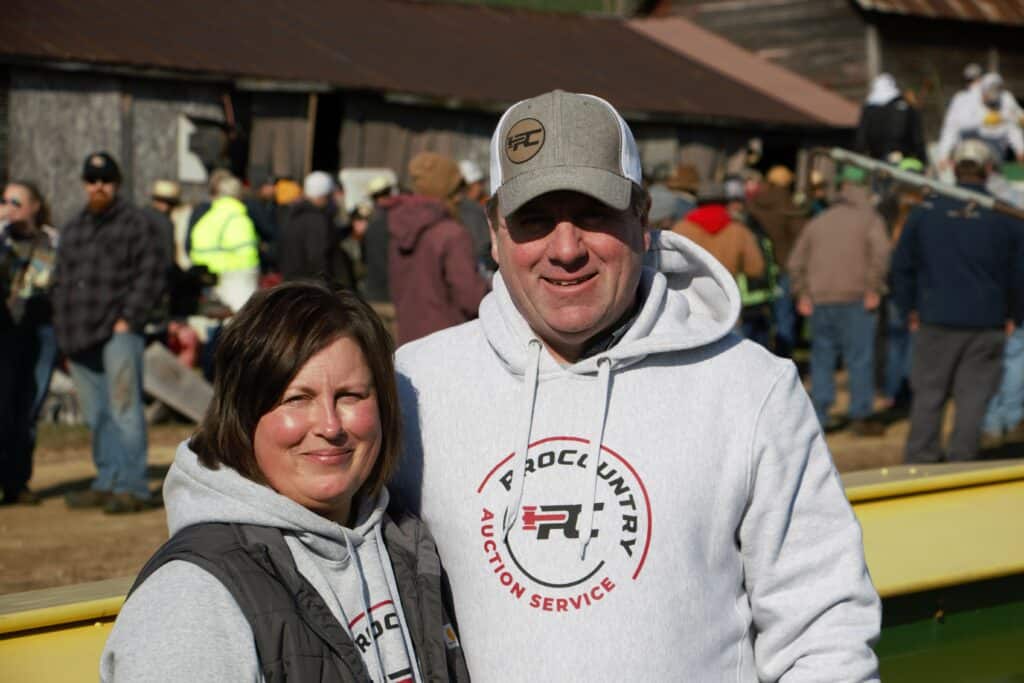
When sellers drop off items, he said they’re tagged and stored in the warehouse or on-site until the auction.
“We are busy – every day we’re involved in the auction business in one way or another,” he said.
In addition to himself, Werlein said the operation has one full-time employee and a handful of employees who work part-time.
He said his wife, Jennifer, is the company’s office administrator.
Diversifying
Werlein said ProCountry does around 50 live auctions a year and also sells property and real estate in the area.
At least once a month, he said it holds an online auction.
Werlein said he also loans himself out to other auction companies, both locally and nationally.
Outside the ProCountry umbrella, Werlein said he commutes to the Twin Cities on Wednesdays to sell automobiles for Manheim – a vehicle auction company with some 100 locations worldwide.
On Mondays, he said he sells cattle in Zumbrota, Minnesota, and also auctions classic cars for Remlinger Collector Car Auctions in Winona, Minnesota, on occasion.
Werlein said the hay market is another place he utilizes his auctioning skills.
A hay auction or hay market, he said, is one of the places where those who need hay can buy it.
Local farmers bring in their consigned hay, straw and bedding, Werlein said, and he vends it.
“The hay auction is kind of where prices are determined – that’s the neat thing about auctions,” he said.
If people want to know what something is worth, Werlein said the first thing they do is find out what price it brought at the auction.
“That’s where new market trends are established, where you have competitive bidding between a willful buyer and a willful seller,” he said. “It’s where new markets are established and prices are set.”
Terms and conditions apply
Werlein said auctions involve offering items to a marketplace under current terms and conditions.
“Meaning not what they were worth yesterday and not what they are going to be worth tomorrow, but what their condition is today, in (their) current state,” he said.
Werlein said the highest bidder defines what the current market value is under the current bidding circumstances.
“Circumstances could be time of year, time of week, time of day, location of the item, how much time (buyers) have to perform ‘or pick up that item,” he said.
A short timeframe, Werlein said, narrows the prospective market.
“If you could designate that you only have a window of opportunity to come pick this item up between 8-10 p.m., that’s obviously going to affect the value of that property,” he said.
Werlein said two main factors drive auction attendance – the items for sale and the seller.
If the items being auctioned belonged to someone who’s well known in the community, Werlein said it can affect crowd size for the better, as can quality items in good condition.
Werlein said weather is also a factor when it comes to live auctions, but sometimes not in the way you’d expect.
“As a live auctioneer, I would rather have kind of a rainy day versus a really nice sunny day, because on a rainy day, nobody can work in the field, nobody can really do anything out there if you’re talking about ag-related items, so why not go to the auction?” he said.
On a sunny day, fewer farmers are likely to show up, and those, Werlein said, are his target audience.
“You might not get your desired outcome as far as participation,” he said. “A little inclement weather is probably going to help your financial bottom line more than sunshine.”
Werlein said the audience and type of wares matter when it comes to weather, too.
Non-outdoors persons seeking collectibles or housewares, he said, might not be keen on standing in the rain.
Both the online and live formats have their advantages, Werlein said, depending on what you’re selling.
“Our ability to reach out and have greater participation obviously comes with an online bidding platform,” he said. “We’ll have a lot more people register, we’ll have a lot more people bidding and I have lived by the belief that if I’m going to maximize your outcome, I’ve got to maximize your participation.”
It’s a different story if you’re selling livestock, Werlein said, like he does every week in Minnesota.
“That is a 100% live auction, and people attend that auction, bid on the livestock and buy the livestock,” he said. “That is certainly a marketplace that is very conducive for the live auction market.”
Changing times
Werlein said the industry has changed in ways other than offering auctions online.
In his father’s day, he said auctioneers commonly worked with auction clerks – who recorded sales, collected money and even provided credit or short-term loans.
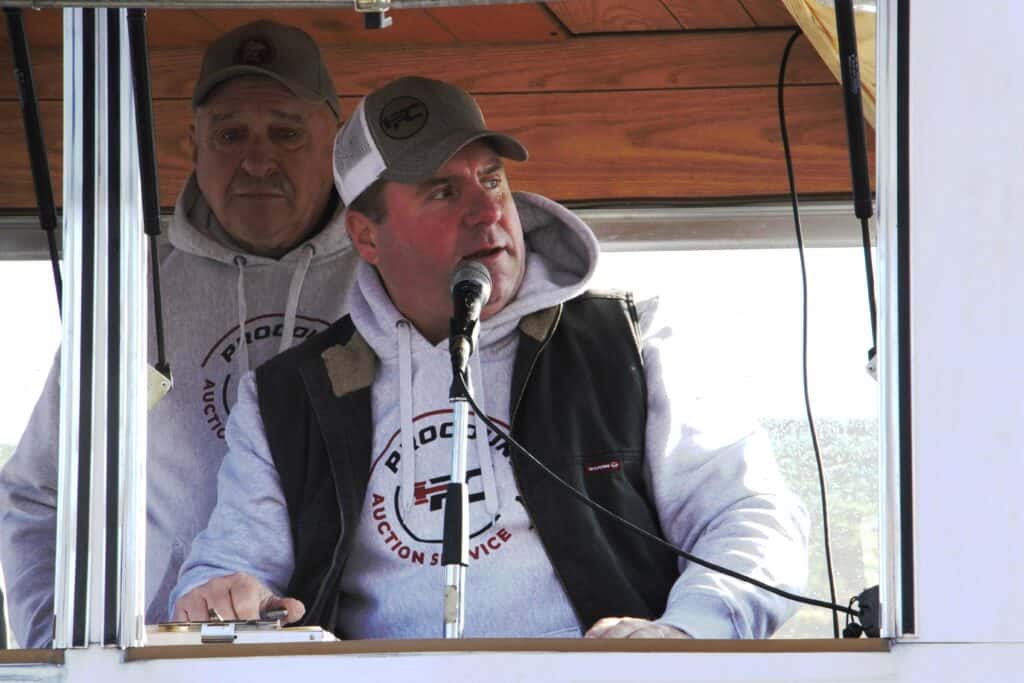
The two entities would work together but were somewhat independent, he said.
Werlein said clerking companies existed to work alongside auctioneers.
“If you think back 30 years ago, when interest rates were 15%, 16%, 17%, financing was hard to come by, and a lot of auction companies would provide short-term financing,” he said. “It was a financing mechanism married up with a clerking mechanism that provided some liquidity on auction day for the people who would come and buy.”
Werlein said an example of this is, say someone wanted to buy five cows and didn’t have the money upfront but is known in the community.
“Maybe he was waiting on a milk check or maybe he had some cattle he was going to sell in the next 30 days, but he just needed a bridge loan and the way interest rates and the financial situation were back in the 1980s, it was just tougher to get a short-term note or have a line of credit to cover that,” he said. “That’s why there was a huge secondary financial market available through these smaller financial companies that would offer some of that short-term financing.”
That’s largely changed, Werlein said.
Now, he said, the auctioneer or auction house pretty much takes care of everything.
Werlein said ProCountry doesn’t do many traditional household auctions.
The amount of labor required, he said, usually doesn’t justify the typically small proceeds.
“There are other places to donate Grandma’s stuff to,” he said. “If she’s got some really nice collectibles or coins or guns or something like that, we will certainly see some of that, but the traditional Grandma‘s coffee table and old green couch – that doesn’t bring much value in the marketplace.”
If you go
Werlein said he has some advice for people considering attending an auction: Show up ahead of time, and ask questions.
He said he also encourages auction-goers to make sure they inspect what they’re interested in buying.
“Make sure you’re thorough about your inspection,” he said. “Don’t be afraid to ask questions.”
Werlein said folks should also try to find out when during the auction lineup the item they are interested in is going to be sold.
“If you’re there for a live auction event, when that item’s going to be sold, as far as time is concerned, could be somewhat vague in nature,” he said. “If you’re dealing with an online auction, that’s already published – the timeline is already there.”
Buyers who make big-ticket purchases without asking questions first, Werlein said, make him hesitate.
“Opinions are what you pay for, and you get what you pay for,” he said. “If you’re going to make a major purchase, call and ask the auctioneer, ‘Hey, I see you’ve got that tractor or whatever coming up – is that thing alright? Is there anything you know about it?’ Because sometimes we learn a lot about it, just handling it or moving it and so forth.”
For more on ProCountry Auction Service, visit procountryauction.com.
 Where food tells a story and farmers are rock stars
Where food tells a story and farmers are rock stars

